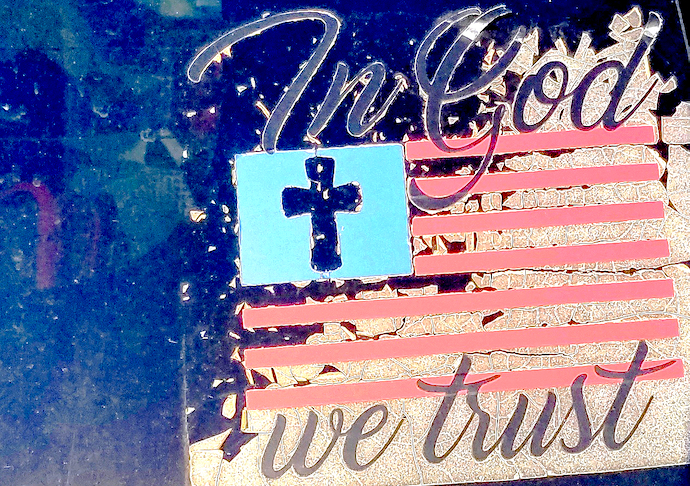The criminal former president is so far ahead of his closest GOP rival that the Washington press corps is already reviving themes from the 2016 and 2020 elections. Here’s the AP on Friday: “Some critics see Trump’s behavior as un-Christian. His conservative Christian backers see a hero.”
How can a lying, thieving, philandering sadist like Donald Trump continue to hold the overwhelming approval of “conservative Christians”? Since he first ran for president, reporters have tried explaining this apparent contradiction. They’re going to keep trying.
But all this rests on an assumption—two assumptions, actually. Once we drop them, a greater truth stands before us in plain sight: For Donald Trump’s Christians, there is no difference between religion and politics. They’re not pretending otherwise. The rest of us shouldn’t either.
What assumptions?
The first is that Christianity is just one thing—the particular teachings of Jesus regarding God’s universal love, let’s say. The second, based on the first, is that there’s a contradiction between Trump and Christianity. How could supporters believe in God’s universal love while backing a man whose campaign has become explicitly a vengeance movement?
There is no contradiction, however, if we concede the obvious—that there’s more than one kind of Christianity, that there’s always been more than one kind, and that there are varieties of Christianity.
Once you concede this, you see a relationship that’s not at all based on a contradiction. It’s based on common interests. They aren’t drawn to him in spite of the fact that he’s a lying, thieving, philandering sadist. They’re drawn to him because he’s a lying, thieving, philandering sadist.
The implication here is one that few want to talk about, including religion reporters and their religious sources. If a variety of religion makes common cause with a bad man (for instance, with a lying, thieving, philandering sadist), isn’t that religion, well, a bad religion?
Reporters don’t want to be seen as adjudicators of faith. So they pretend that politics and religion are separate. Their religious sources don’t want the reputations of their respective religions to be irreparably harmed by Trump and his Christians so they pretend that religious faith isn’t what’s pushing them together. It’s politics, they say.
For instance, the AP cited retired Catholic priest, the Rev. Peter Daly.
In 2017, Daly wrote “Donald Trump’s gospel is not the Gospel of Jesus” in which he “depicted Trump as an uncharitable bully, prone to lying, lacking in empathy and tolerance.”
“He sees every opponent as someone to be shouted down or roughed up,” Daly wrote. “He is not a peacemaker.”
Six years later, the AP reported, Daly still can’t fully explain “why so many conservative Christians remain in Trump’s camp despite behavior and rhetoric ‘that are antithetical to everything they stand for.’”
It must be politics, not religion, he says. According to the AP:
“Some pro-Trump pastors have relished the proximity to power afforded during White House visits or special political events, Daly said. And some rural, white Christians ‘feel like nobody speaks for them,’ Daly added. ‘They think, “Here’s Donald Trump. He’ll be our champion.” It has nothing to do with being Christian. It’s the politics of grievance.’”
Oh, but it has everything to do with being a Christian!
This is evident by Christian supporters explaining themselves in Christian terms:
“Some evangelicals, since early in Trump’s presidency, have likened him to Cyrus the Great, the Persian king who, according to the Bible, enabled Jews to return to Israel from their exile in Babylon.” [The Jews here are metaphors for God’s chosen people.]
They explain themselves in explicitly political terms, too.
Megachurch Pastor Robert Jeffries told the AP: “In many ways, Christians feel like they are in an existential cultural war between good and evil, and they want a warrior like Donald Trump who can win.”
There’s no difference between religion and politics.
I don’t know why there’s so much resistance to stating the obvious. Any religion that supports Donald Trump, and does so in explicitly religious terms, is not a religion that anyone, especially religious people, should be defending. Christianity isn’t just one thing. There are many Christianities. What’s so bad about calling one of them bad?
Most people, especially religious people, prefer to say that the Christians who support Trump aren’t “true” or “real” Christians—as if all Christianities privilege the Bible’s more peaceful and inclusive teachings. This is not (and never has been) the case.
God’s universal love, for many Christianities, is secondary to God’s particular (non-universal) punishment of God’s enemies—of the people who stand against Donald Trump. Politics and religion are not separate. They are one. Trump’s Christians don’t pretend otherwise.
The rest of us shouldn’t either.





